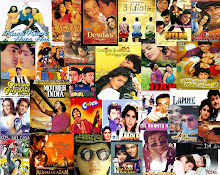BLACK
Producer: Applause Entertainment
Director: Sanjay Leela Bhansali
Cast: Amitabh Bachchan, Rani Mukherje
Director Sanjay Leela Bhansali offers this film as a tribute to Helen Keller. It is a remake of the Helen Keller story.
I am a filmgoer not a critic. So, I don't always use the proper terms for the technical aspects of filmmaking when I describe how I experience a film.
Sometimes I think film critics forget not all filmgoers are as aware of all the technical aspects of filmmaking as critics. Like a wine connoisseur who has more taste buds than the average person and can taste subtleties missed by others, a film critic focuses on details in the structure, characterizations, plot, dialogue, camera work, direction, musical score, lyrics, choreography, and more to a finer degree than an average filmgoer.
As a filmgoer, I am more forgiving of a plot that may take a bit of imagination to piece together as a whole, or characterizations that may be bolstered by affection for the actri, or dialogue that may be mentally revised to suit the scene.
If you are familiar with the Helen Keller story, the director sticks close to the story including the famous dining room scene and water scene. Because in this story, Michelle, the blind and deaf girl, has a male teacher, the director, while staying with the original story, must take a slightly different slant when he tells how Michelle and her teacher grew over the years to reflect the successes and missed opportunities that Helen and her teacher, Anne Sullivan, experienced.
The cinematography in "Black" is a large part of the film. Most scenes are beautifully cast in a variety of shades of blue and brown with light streaming in or illuminating parts of the scenes. The use of color and light recalled the film "Barsaat" by Raj Kapoor with his dramatic use of black and white shading.
Rani Mukherje has become a surprisingly good actress. I first saw her in "Hey Ram" and her character, while played well, did not stand out. Then she seemed to burst on the scene as a screen model, glamorous and pretty. Now, she is everywhere. I saw a bit of her talent range in "Calcutta Mail." She is expressive, funny, and a good dancer. She is a quick study and improvises on the spot. Playing Michelle in "Black" appeared to be a challenging role for Rani. Rani does not have a stoic face, so she seemed quite expressive at times when I expected a more solemn countenance. But, Rani developed her own style to express the hesitating walk and perplexed expression of a blind and deaf person.
The young girl, Ayesha Kapoor, who played Michelle as a child, did an excellent job. She is a natural actress. She seemed to flow in the role and move through the scenes flawlessly. How did a young child learn to mimic the face of a blind person? She is most convincing.
I had only seen Amitabh Bachchan in recent films like Mohabbatein, KKKG, Veer-Zaara, and Baghban. I had no way to judge his performance in “Black” against his earlier work. But, his energetic and sympathic portrayal of Michelle's teacher, Mr. Sahai, took my breath away as he took on the challenge of teaching Michelle and devoted his life to her intellectual growth.
One thing I like about Bollywood films is they are not afraid to illustrate the varied history of India, openly or subtly, in their stories. In this story, Michelle comes from an Anglo-Indian family. With no reference to the past, you instinctively know that the alliance stemmed from the history of British colonization.
At times, I found the opulence of the settings oppressive. What is the purpose of opulence if not to impress?
I missed several aspects in this film that I find in many Bollywood films. There were no song and dance routines. There were no substantial secondary characters or multiple themes. In my mind, these missing aspects limit “Black” to a highly-perceptive adult audience. Also, except for a western-style wedding, there were no rituals in any scenes. I had become used to seeing various temple and worship rituals in Bollywood films, so their absence was noticeable.
But, in a healthy film industry like Bollywood, it is nice to be able to view the vision of different directors, and the talent of many fine actri and filmmakers. Bollywood films don't have to all be the same. “Black” is a stunningly visual film, and a finely crafted and portrayed story.
One memorable line came when the college trustee says to Michelle's teacher, "Science does not believe in miracles."
My only objection was -- when are movie theaters going to change their menus? Popcorn, candy, soda, and nachos and cheese are fattening and poor nutritional food choices. I suggest that movie theaters reexamine their snack selections. Movie theaters are behind the times. Restaurants and fast-food venues have revised their menus to include vegetarian choices, fruit and fruit juices, vegetable snacks, decaffeinated beverages, and more. Why not movie theaters?
p.s. if you are paying attention to this blog, you may note that this is my first review of a non-SRK film.
my 1000th Indian film: Inaam Dus Hazaar
6 years ago

2 comments:
I have just gone through all you reviews. It's very refreshing to hear another point of view on Bollywood. I like your style of writing. Keep up the good work.
P.S if you want to check out some really quality social indian cinema. I would recommend any Manoj Kumar film. For example 'Purab aur Puschim' (East and West) and 'Roti Kapada Aur Makhan' (Food, Clothing and Shelter).
Sony, thanks for the compliments and suggestions, I will check them out.
Post a Comment